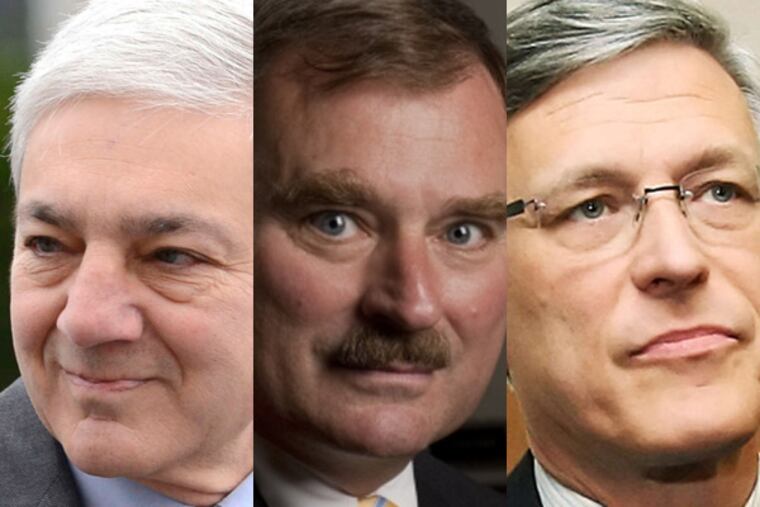3 indicted in Jerry Sandusky case back in court Tuesday
Almost five months after three former high-ranking Pennsylvania State University officials were ordered to stand trial on charges of covering up evidence that coach Jerry Sandusky was molesting children, they are scheduled to return to a Harrisburg courtroom Tuesday for a hearing that could shape the outcome of the case.

Almost five months after three former high-ranking Pennsylvania State University officials were ordered to stand trial on charges of covering up evidence that coach Jerry Sandusky was molesting children, they are scheduled to return to a Harrisburg courtroom Tuesday for a hearing that could shape the outcome of the case.
The purpose of the hearing has been shrouded in secrecy - the official court docket doesn't specify the nature of the proceeding, and state prosecutors say only that it pertains to sealed grand jury information.
But Dauphin County President Judge Todd A. Hoover has reserved several days for the hearing, a sign it might be used to address a major unresolved question in the trial of former President Graham B. Spanier, retired Vice President Gary Schultz, and athletic director Tim Curley:
Can Penn State's former top lawyer, Cynthia Baldwin, be a witness for the prosecution?
Baldwin, a former state Supreme Court justice, was general counsel for the school in the early days of the Sandusky investigation, and she accompanied the three administrators when each testified before the grand jury investigating Sandusky.
Later, she became a grand jury witness against them.
Defense lawyers have asked the judge to bar Baldwin, her secret testimony - and anything the defendants told her in confidence - from the trial.
Spanier, Schultz, and Curley are charged with perjury and conspiracy for allegedly failing to act on complaints that Sandusky was assaulting children, and lying to investigators as the Sandusky probe expanded.
Prosecutors have accused them of building a "conspiracy of silence" to shield Sandusky and Penn State from harm while Sandusky continued abusing children. He is serving a prison sentence of 30 to 60 years.
No trial date has been set for the three administrators. Their lawyers contend they are innocent.
They allege Baldwin started out representing Spanier, Schultz, and Curley, then switched sides and gave privileged information to state investigators who were building a case against them.
"I believed that Ms. Baldwin was representing me during and in connection with the grand jury proceedings and that she was acting in my best interests," Spanier said in an affidavit filed in the case.
Baldwin's attorney, Charles De Monaco, has disputed the allegations. He said Baldwin has the "highest integrity."
Prosecutors from the state Attorney General's Office have said Baldwin's testimony should stand because any possible conflicts of interest in her representation arose after she heard the men testify before a grand jury, not while she sat in on their testimony.
"Based on their interviews prior to testifying, it appeared that the defendants intended to cooperate in the investigation," prosecutors stated in a filing. "That the defendants actually intended to mislead the grand jury and the commonwealth would not alter the fact that, at the time they were represented by attorney Baldwin, there was no conflict of interest."
In her grand jury testimony, portions of which were included in the indictment, Baldwin contradicted Spanier's claim that he didn't know the details of two earlier complaints about Sandusky with young boys.
She also said the three administrators tried to obstruct the state investigation by withholding documents and tried to downplay the investigation when discussing it with university trustees.
After Spanier was indicted in November 2012, along with Curley and Spanier, attorneys were stunned to learn of Baldwin's testimony and immediately filed motions asking that it be thrown out.
Elizabeth Ainslie, Spanier's attorney, wrote that Baldwin's cooperation meant Spanier unknowingly spoke to the grand jury while he had no legal representation, and has asked that the charges against him be dismissed.
"The charges brought against Dr. Spanier are based, in large part, on Ms. Baldwin's testimony before the grand jury as to privileged information and attorney work product," she wrote. "At no time did Dr. Spanier waive his attorney-client privilege."
Ainslie has also asked Judge Hoover to order prosecutors to release Baldwin's complete grand jury testimony, as well as information regarding whether Baldwin has been granted immunity from prosecution in exchange for her cooperation. Another court filing this week suggested Schultz may sue Baldwin for malpractice.
Early next year, a former federal prosecutor is expected to release his report, commissioned by Attorney General Kathleen Kane, on how the state handled the long-running investigation.
610-313-8113